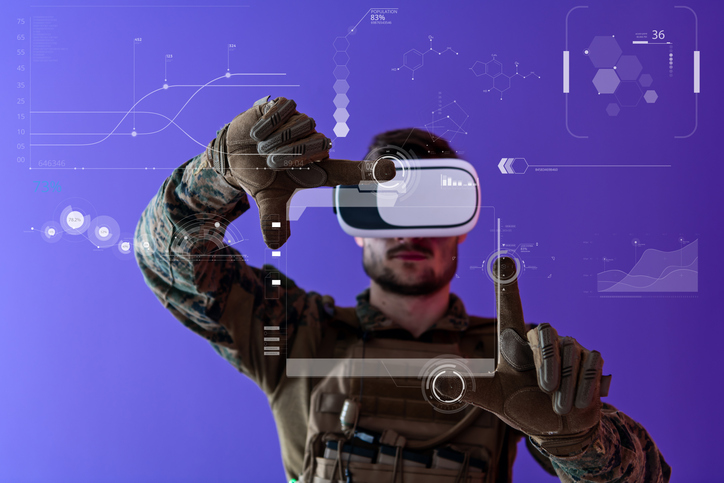
Posted On : Dec 2 2024
How AI is Transforming Military Forces
Artificial Intelligence (AI) is rapidly transforming military forces worldwide, reshaping how they operate, plan, and engage in combat. From enhancing decision-making processes to revolutionizing autonomous systems, AI's integration into military operations is creating a paradigm shift in defense strategies and capabilities. This article explores the multifaceted impact of AI on military forces and the implications for future warfare.

Enhanced Decision-Making and Strategic Planning
One of the most significant impacts of AI in the military domain is its ability to process vast amounts of data quickly and accurately. AI-powered systems can analyze intelligence from various sources, including satellite imagery, communications, and social media, providing military leaders with comprehensive situational awareness. This real-time analysis enables commanders to make informed decisions rapidly, enhancing the speed and effectiveness of military operations.
AI algorithms can also simulate numerous scenarios, predicting potential outcomes based on different variables. This predictive capability aids strategic planning, allowing military forces to prepare for various contingencies and adapt their strategies accordingly. By anticipating adversaries' moves and identifying optimal courses of action, AI enhances the military's ability to respond to evolving threats.
Autonomous Systems and Robotics
AI-driven autonomous systems are revolutionizing the battlefield. Unmanned aerial vehicles (UAVs), autonomous ground vehicles, and maritime drones equipped with AI capabilities can perform a wide range of tasks, from reconnaissance and surveillance to logistics and combat operations. These systems reduce the risk to human soldiers and increase operational efficiency.
For instance, AI-enabled UAVs can conduct surveillance missions over hostile territory, gathering critical intelligence without putting pilots at risk. Autonomous ground vehicles can navigate complex environments, transport supplies, and evacuate wounded soldiers. These robotic systems can operate in hazardous conditions, such as areas contaminated by chemical, biological, radiological, or nuclear (CBRN) materials, where human presence would be dangerous.
Cybersecurity and Information Warfare
In the realm of cybersecurity, AI is a game-changer. Military forces increasingly rely on AI to defend against cyber threats and conduct offensive cyber operations. AI algorithms can detect and respond to cyberattacks in real-time, identifying anomalies and mitigating potential breaches before they cause significant damage.
Moreover, AI is instrumental in information warfare, where controlling the flow of information is crucial. AI tools can analyze vast amounts of data from social media and other platforms to identify and counter disinformation campaigns. By automating the detection of false narratives and coordinating responses, AI helps maintain the integrity of information and supports psychological operations.
Enhanced Training and Simulation
AI is also transforming military training programs. AI-driven simulators provide realistic training environments, allowing soldiers to practice tactics and procedures in a safe, controlled setting. These simulations can replicate complex combat scenarios, including urban warfare, cyber engagements, and joint operations with allied forces.
Machine learning algorithms enable these training systems to adapt and evolve based on the trainees' performance, providing personalized feedback and improving the effectiveness of training. Virtual reality (VR) and augmented reality (AR) technologies, powered by AI, further enhance training by immersing soldiers in realistic environments, preparing them for the challenges of modern warfare.
Ethical and Operational Considerations
The integration of AI into military forces raises several ethical and operational considerations. Autonomous weapons systems, in particular, pose significant ethical dilemmas regarding accountability and the rules of engagement. The potential for AI-driven systems to make life-and-death decisions autonomously has sparked a global debate about the need for regulation and oversight.
Additionally, reliance on AI introduces vulnerabilities, such as the risk of adversaries hacking AI systems or using AI to develop countermeasures. Ensuring the robustness and security of AI technologies is paramount to maintaining their effectiveness and safeguarding military operations.
Conclusion
AI is undeniably transforming military forces, offering unprecedented capabilities that enhance decision-making, operational efficiency, and strategic planning. Autonomous systems, cybersecurity advancements, and improved training programs are just a few examples of how AI is reshaping modern warfare. However, these advancements come with ethical and operational challenges that must be addressed to ensure the responsible and effective use of AI in military applications.
As AI continues to evolve, its impact on military forces will likely grow, driving innovation and changing the nature of warfare. Embracing AI's potential while navigating its challenges will be crucial for military forces aiming to maintain a strategic advantage in an increasingly complex and technology-driven world.
No Comments Added




















